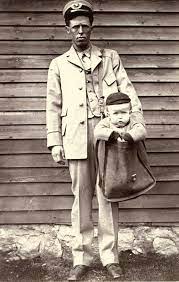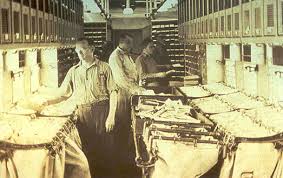

Chapter 8: Mailbabies
The Watkins' went to visit their mother and brother John, in Ohio over the Christmas of 1914.
Miss Penelope came back with such a story that people had trouble believing it.
The mail service in Batavia, Ohio accepted the task of mailing a little boy, from his parent’s home to his grandparents,
about a mile away. It cost all of 15 cents. (back then, a loaf of bread cost 6 cents)
Word got around about the event and it set tongues a-waggin’.
(conversely, did you know that wagons have tongues? Look it up).
This happened across the country sparsely for about three years until the US Postmaster General banned the practice.
A woman in Idaho mailed her 14-pound baby some 12 miles, and a 6 year-old girl was sent from Florida to Virginia, again for 15 cents.
A few of the ladies talked this over and determined they should call on the local postmaster, Mr. Letterman.
They expressed their concerns, that however diligent the local postal employees might be, it wasn’t prudent for children
to be toted about in such a manner.
The postmaster assured them that no such business would be taken on locally.
His office had enough living things to deliver.
Companies mailed honeybees that had to be handled, and in early spring, the post office sounded like a chicken house with all the baby chicks being delivered hither and yon. They certainly didn’t need to be given charge of colicky, hungry babies with dirty diapers.
Mr. Letterman said, "We are after all, postmen, not nannies."
One of the ladies on this self-formed committee was 'with-child' at the time. She heard the term ‘prudent’ so often during those discussions, that upon birthing a little girl, she named her 'Prudence'.
After holding her baby, she wondered how any woman could hand her child over to the post office to be delivered to someone else, often an old bachelor, who might not know which end of a baby to feed, and which end to diaper.
Living things weren’t the only cumbersome items carried through the mails.
February brought seed catalogs from Earl May and Henry Fields, both from Shenandoah, Iowa.
And each spring and fall, the 'big' mail order catalogs were delivered, which just about wore out the mail carriers.
During the discussion about mailing children, one lady asked jokingly, "Have you ever delivered a mail-order bride?"
He said that while he had seen many arrangements made through the mail for matrimony, the bride was usually delivered by train.
Of course, most everyone knew that sweet-notes ought to be sent in a sealed letter, never by postcard. Between the mail carrier and nosy little brothers, many postcards was read twice before the girl finally laid her delicate hands on it.
And for thrifty boyfriends trying to save money, postcards often got them in trouble with the young lady's daddy.
Postmaster Letterman did take some time to talk about matrimonial agencies that used to ply their trade, and still do,
under several different names, such as matchmaking societies.
He heard of one man from Idaho who mail-courted a woman from Kansas. When he got to her town for their wedding, he and the bride’s cousin from Kansas City fell for each other. They ran off and left the bride in the lurch, in the church.
Another man, a traveling salesman, had a habit of marrying mail-order brides.
He would stay with each of them for a month-long honeymoon, and then take off with her money.
Mr. Letterman also told about a local farmer who contracted matrimony with a young woman from back East.
He went East to marry her and brought her home. Once they landed back here, her widowed mother began insisting
that her son-in-law help with the expenses of the family back East. As it turns out, there were five daughters in the family, and the mother would marry off the daughters through matrimonial agencies as each girl came of age. She would then wheedle money from each son-in-law. The two boys of the family lived with the mother and stayed marginally employed, yet lived comfortably with the subsidies gained through their sisters' marriages.
(This was the local man spoken of earlier, who had an unhappy wife and a lazy son.)
This kind of thing still happens with foreign brides.
The girls from poor countries are often expected to funnel money back to her family.
The postman finished his visit with the women, and they left assured that they wouldn’t see a postman with a baby in his mail sack.
The mail train was about to come through from Des Moines, so the postmaster needed to get to the depot and swap sacks of mail, so he could begin sorting tomorrow’s mail. Before the days of trucks delivering the mail from city to city, train cars were used.
From 1864-1977, the mail service had special railroad cars that received mail, sorted it and put it in bags for delivery in the towns along the rail route. It wasn't snail mail, it was rail-mail. In towns where the train wasn’t scheduled to stop, a grabbing hook might be used to deliver or receive the bags of mail. In some towns, the mail was thrown out of the train onto the depot platform. In cities with a lot of mail, the train would stop to deliver the sorted mail and pick up new mail from the area. Little towns that didn’t have train service would get their mail from the nearest postal distribution point.
As seen in the second photo, the mail car workers would spend their work-shift sorting mail while the train was rolling. At the end of the shift, the workers would rent a bed at the post office in the town where they got off for the night. Then they boarded another mail train the next day and sorted mail on their way back home. They had to memorize town names and mail routes so each stop would get the right mail.
Of course, mistakes happened from time to time, and a piece of mail might take a while to get to its proper destination.
There were letters from WW2 that still turned up in the 1970s when I was a young man.
Eric J. Rose
middlegrademysteries.com
photo1: washingtonpost.com
photo2: postalmuseum.si.edu